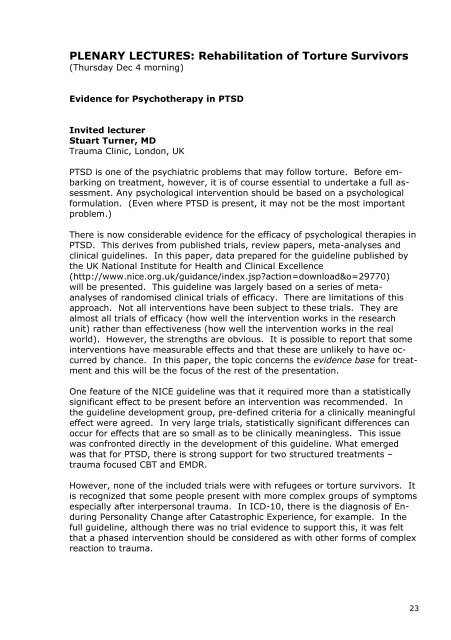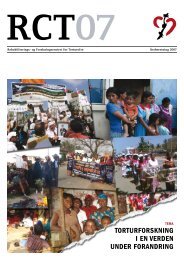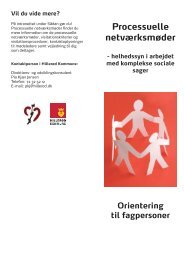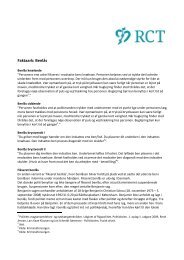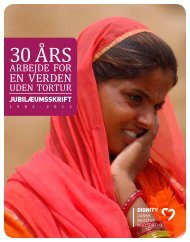Rehabilitating Torture Survivors - Dignity - Danish Institute Against ...
Rehabilitating Torture Survivors - Dignity - Danish Institute Against ...
Rehabilitating Torture Survivors - Dignity - Danish Institute Against ...
You also want an ePaper? Increase the reach of your titles
YUMPU automatically turns print PDFs into web optimized ePapers that Google loves.
PLENARY LECTURES: Rehabilitation of <strong>Torture</strong> <strong>Survivors</strong>(Thursday Dec 4 morning)Evidence for Psychotherapy in PTSDInvited lecturerStuart Turner, MDTrauma Clinic, London, UKPTSD is one of the psychiatric problems that may follow torture. Before embarkingon treatment, however, it is of course essential to undertake a full assessment.Any psychological intervention should be based on a psychologicalformulation. (Even where PTSD is present, it may not be the most importantproblem.)There is now considerable evidence for the efficacy of psychological therapies inPTSD. This derives from published trials, review papers, meta-analyses andclinical guidelines. In this paper, data prepared for the guideline published bythe UK National <strong>Institute</strong> for Health and Clinical Excellence(http://www.nice.org.uk/guidance/index.jsp?action=download&o=29770)will be presented. This guideline was largely based on a series of metaanalysesof randomised clinical trials of efficacy. There are limitations of thisapproach. Not all interventions have been subject to these trials. They arealmost all trials of efficacy (how well the intervention works in the researchunit) rather than effectiveness (how well the intervention works in the realworld). However, the strengths are obvious. It is possible to report that someinterventions have measurable effects and that these are unlikely to have occurredby chance. In this paper, the topic concerns the evidence base for treatmentand this will be the focus of the rest of the presentation.One feature of the NICE guideline was that it required more than a statisticallysignificant effect to be present before an intervention was recommended. Inthe guideline development group, pre-defined criteria for a clinically meaningfuleffect were agreed. In very large trials, statistically significant differences canoccur for effects that are so small as to be clinically meaningless. This issuewas confronted directly in the development of this guideline. What emergedwas that for PTSD, there is strong support for two structured treatments –trauma focused CBT and EMDR.However, none of the included trials were with refugees or torture survivors. Itis recognized that some people present with more complex groups of symptomsespecially after interpersonal trauma. In ICD-10, there is the diagnosis of EnduringPersonality Change after Catastrophic Experience, for example. In thefull guideline, although there was no trial evidence to support this, it was feltthat a phased intervention should be considered as with other forms of complexreaction to trauma.23


